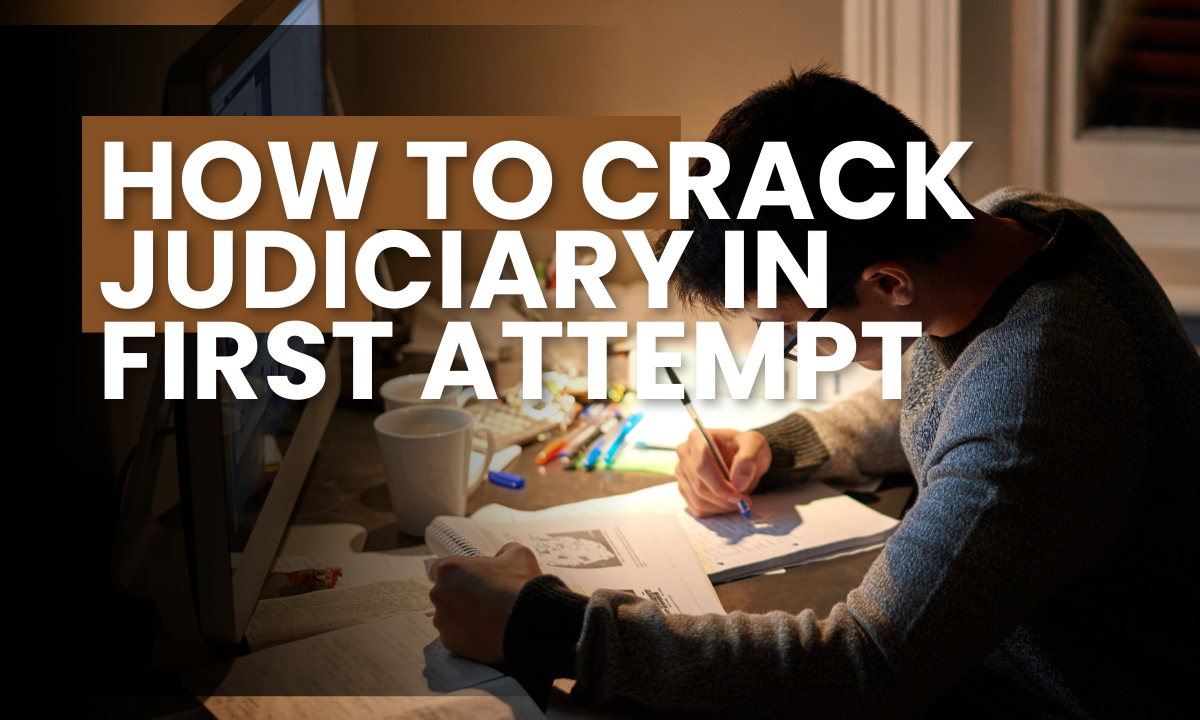+91 9990898327
Office : 632, Dr. Mukherjee Nagar, Delhi 110009
Mon-Sun: 09:00AM - 08:00PM

To clear the judiciary in the first attempt, it is important for candidates to formulate effective strategies, focus on preparation, and undertake consistent efforts. It is though challenging to achieve the goal, but one can do the same with discipline and a concise roadmap.
Judiciary exams, which are conducted to assess a candidate's legal aptitude, ability to think critically, and ability to apply legal principles in different situations, are conducted in three stages.
This exam which consists of objective-type questions, is the first and the foremost exam which is conducted for assessing a candidate's basic knowledge. Each question is marked with fixed points, and candidates in this exam are required to score a fixed number before proceeding to the next stage.
Comprising essay-type questions. The purpose of conducting the mains exam is to assess a candidate's in-depth knowledge. Even in this exam, every question has fixed points, and candidates who clear this become eligible to proceed with the viva voice.
Viva's voice is an interview conducted by a panel of judges to assess a candidate's practical application of legal knowledge, clarity of thought and articulation, communication skills, demeanor, personality, and professionalism.
It is important for candidates to follow the tips elaborated below for clearing the judiciary exam in the first attempt:
Thorough understanding of the syllabus and exam pattern: It is imperative for the candidates to thoroughly review the syllabus for preliminary and main exams and understand the exam pattern by getting clarity on the weightage of each subject.
The creation of a balanced study plan that covers all the subjects, including extra time for weak areas, revision, and mock tests, is the key to excelling in judiciary exams. It is imperative for the candidates to not only create the same but also follow it religiously by devoting daily hours to studying and breaking down the topics.
Once the candidates create a structured study plan, it is important for them to strengthen their foundation by clearing all their concepts in criminal and civil law. Besides getting clarity on the same, the candidates should understand the application of landmark verdicts in real life and keep themselves updated with the news related to law and judiciary.
Practicing answer writing to fair well in mains
The focus of the mains exam is to evaluate a candidate's in-depth knowledge of the law. To reach the next stage of the interview, candidates should practice writing legal answers on a daily basis so that during the exam they can write well within a limited time.
To assess preparedness, identify weak areas, and work on time management, students should focus on mock tests since they simulate actual exam conditions. Regular testing prepares students for practicing under time constraints, identifying their weak areas, refining exam strategies, becoming familiar with the exam pattern, and staying confident on exam day.
To stay focused while preparing for the exam and excel, the students must make the right choices and refrain from committing the mistakes mentioned below
One should not ignore the syllabus or the exam pattern since a proper understanding of the same helps candidates prioritize the topics and ensures that they do not miss out on areas having the maximum weightage.
It is important to stick to a defined study schedule and stay disciplined throughout the preparation. One should avoid last-minute cramming since the same can result in panic.
To crack the judiciary exam on the first attempt, students should not solely focus on theoretical knowledge without practicing application-based questions since the exams require candidates to apply their theoretical knowledge practically. One should practice writing detailed answers on a daily basis to improve their ability to present arguments concisely and clearly.
Instead of overloading themselves with a large number of books and resources, candidates should stick to standard textbooks, previous year question papers, and quality study material, revise the concepts on a daily basis, and keep themselves updated with current affairs.
Candidates who ignore previous year's question papers and solve mock tests barely, are not able to crack the judiciary exam in the first attempt as they are not aware of the exam pattern, type of questions, and level of difficulty.
To prepare efficiently for the preliminary and main exams, candidates should refer to the Indian Penal Code by R.V. Kelkar and the Indian Penal Code by K.D. Gaur, Criminal Procedure Code by K.N. Chandrasekharan Pillai, The Law of Evidence by Ratanlal & Dhirajlal, to prepare for criminal law subjects. While they prepare for civil law, students should refer to Mulla's Code of Civil Procedure and Constitutional Law of India by M.P. Jain for constitutional law.
It is challenging to crack the judiciary exam in the first attempt, but one can achieve this by creating an effective strategy to study for the exam and avoid committing mistakes that can be detrimental during the preparation process.
It often takes one to two years to prepare for the judiciary exam. Students should devote at least one to two years, as they then get sufficient time to strengthen their concepts, understand the exam structure and prepare thoroughly.
One can improve their performance in mock tests by analyzing their mistakes after every test, focusing on the areas where they are scoring low, solving questions under timed consideration, and eventually increasing the number of tests.
To prepare for the interview round, one should be familiar with everything mentioned in the application, practice mock interviews, and stay updated on the latest legal developments, including landmark decisions and verdicts.
Post a comment